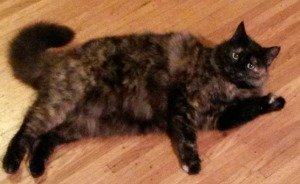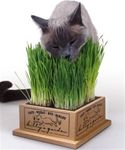What Exactly Are Cat Hairballs?
"And what can I do about them?!"
A Common Feline Health Problem
Cat hairballs, also called furballs, hair balls or fur balls, are a fairly regular event in the lives of most felines and their human companions.
It can be disturbing to a new cat owner to find a wet, black hairball on their carpet that looks kind of like it came from the other end of their kitty.
And, of course, sometimes the hacking and vomiting up of the cat hairball causes an inexperienced cat owner a great deal of concern (and lots of discomfort when you step on a fresh hairball in the middle of the night!).
So, What Exactly is a Hairball?
Cat hairballs are masses of fur that form in your kitty's stomach. They are one of the most common health problems of felines.
If you have any experience with cats or kittens, you know that they are almost continuously grooming themselves by licking their coats. Their tongues have little barbs that help them to groom, but also cause them to swallow a lot of fur. Of course, long-haired kitties are more likely to have hairballs than shorthairs.
Most swallowed fur can pass through your kitty's digestive system without you ever noticing. You'll recognize the ball of fur only if it is vomited up.
When it's fresh, it's wet and dark and shaped like a small dark cigar or sausage (both of which are not great examples if you're a non-smoker and vegetarian like me!).
How to Prevent Them
Brushing your kitty regularly can help to remove excess fur and keep your kitty from swallowing the fur when she grooms. Brushing your feline is particularly useful during shedding season (which will vary depending on the climate you live in, but is usually during the spring and summer months).
 "Shadow" the Longhaired Tortoiseshell
"Shadow" the Longhaired TortoiseshellIt's a good idea to get in the habit of regularly (ideally every day) brushing your cat when he's a kitten. This will get him used to grooming and make it easier for you both in the coming years.
Felines also tend to shed more when they're in stressful situations. You may notice that a trip to the veterinarian often leads to a lot of loose fur.
Feeding your cat a healthy well-balanced diet is not only one of the best things you can do to keep your feline companion healthy, it will also help to keep her coat in good shape. This helps to prevent excessive shedding and, in turn, helps to prevent your kitty from accumulating excessive fur in her digestive system.
How Do Felines Get Rid of Furballs?
Much of the fur that your cat licks off passes through her digestive system and is eliminated in the stool. Sometimes the accumulation of fur in your kitty's belly becomes too big to pass in her stool and needs to be vomited out.
If you have an outdoor kitty, you may notice him eating grass. Somehow cats instinctively know that this is good for their health.
Eating grass helps your cat pass the hairball, but unfortunately, the edges of outdoor grass can sometimes cause cuts in your kitty's mouth; and there is also the issue of pesticides or other chemicals that some people use on their grass that could potentially be poisonous.
Indoor cat grass is a healthy option to help your kitty take care of furballs.
Potential Health Problem
In the worst case scenario, your cat may not eliminate the furball through his or her stool or he or she may not be able to vomit out the hairball.
It could cause a blockage in their intestines. This can cause constipation. In serious cases, your kitty may need surgery to remove the cat hairball.
If you notice any changes in your cat or kitten's behavior, like constipation, depression, lethargy, or an unusual lack of interest in eating, you should contact your veterinarian immediately.
Additional Resources for Cat Hairballs
Only Natural Pet Store - has many different types of natural hairball remedies for when a little extra help is needed in passing furballs. They also carry supplements that can help prevent this problem in the first place.
Treatment for Cat Hairballs - This page at MyHealthyCat.com has additional information about treatment options for this common problem.
Common Cat Health Problems - See this page for more information about taking care of your healthy cat and other common feline problems.
Use the Search Box to find more feline info. |
From Cat Hairballs to My Healthy Cat home
If you suspect your cat is ill, please contact your veterinarian immediately.
The material presented in this site is for informational and entertainment purposes only. It is not intended to replace your veterinarian's advice.
Copyright 2003-2025 © www.myhealthycat.com
Sitemap | Contact Us | About Us | Disclosure | Privacy Policy


